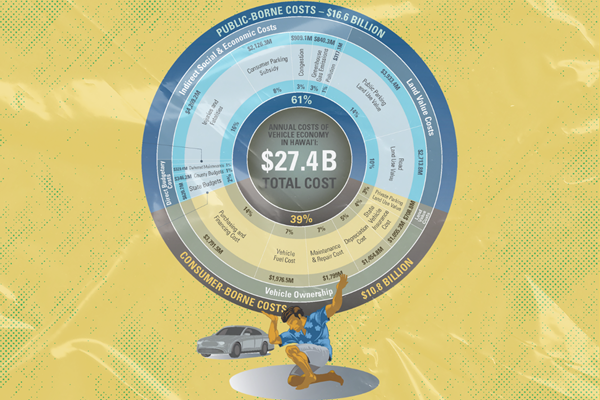Cost of Hawai‘i’s car-centric transportation system mounts
Jun 23, 2025

A new report released by Ulupono Initiative and global consulting firm ICF paints a daunting picture of how much the vehicle-based transportation system costs Hawai‘i residents. A hefty $27.4 billion is going into the state’s vehicle economy – which includes roadways, bridges, vehicles, parking and societal costs – a huge strain on household budgets that are already stretched thin.
This number is a 31% increase since 2021 and a major contributor to the state’s high cost of living. The average annual cost to households regardless of vehicle ownership already comes at a high price tag of $33,600. The cost to households that do own a vehicle is another $21,800, bringing the total to just over $55k. These car-centric transportation fees are collective and have direct and indirect costs to the public. Factors such as taxes, cost of dedicated lands, and societal impacts are all included in the total cost. The report also shows that the public pays 61% of the system costs, and the remaining 39% is paid through vehicle ownership and parking fees.
The economic toll of the current system increases financial stress for residents, especially low-income households. The state’s cost of living is one of the highest in the nation. According to a recent UHERO report, the median cost for a single-family home on Oahu is over $1.1 million, and the median rent is approaching $2K. Hawai‘i Housing Factbook reports that renters spend more than 30% of their income on rent, which classifies them as rent-burdened, and 29% are considered severely rent-burdened, spending over half of their income on rent.
We invite you to learn more about this report, which is an important reminder that expanding transportation choices is a critical component to creating a more affordable Hawai‘i for residents. Focusing on walking, biking, rolling and transit lessens the environmental impact and encourages more active living, creating a win-win situation.

